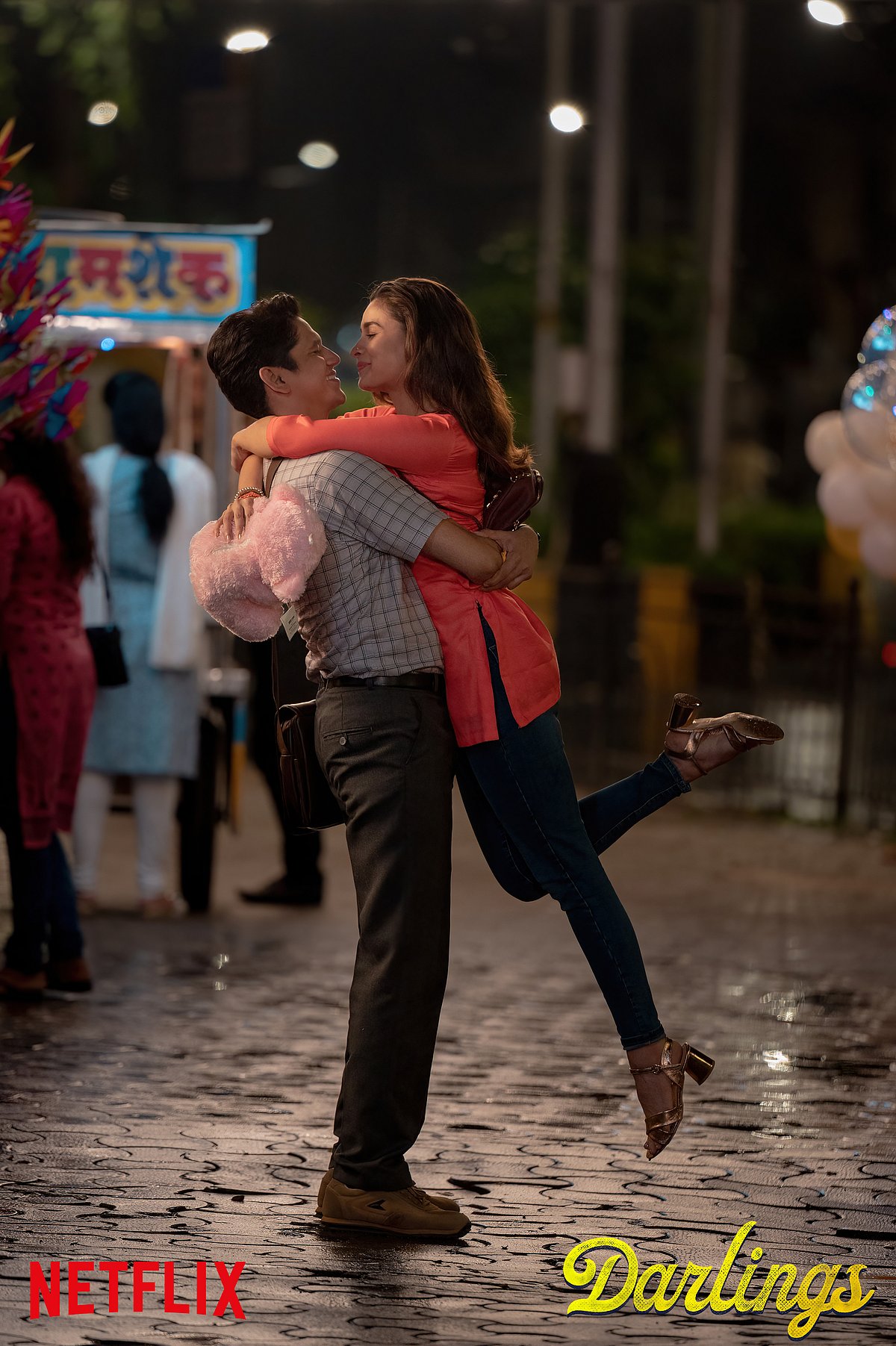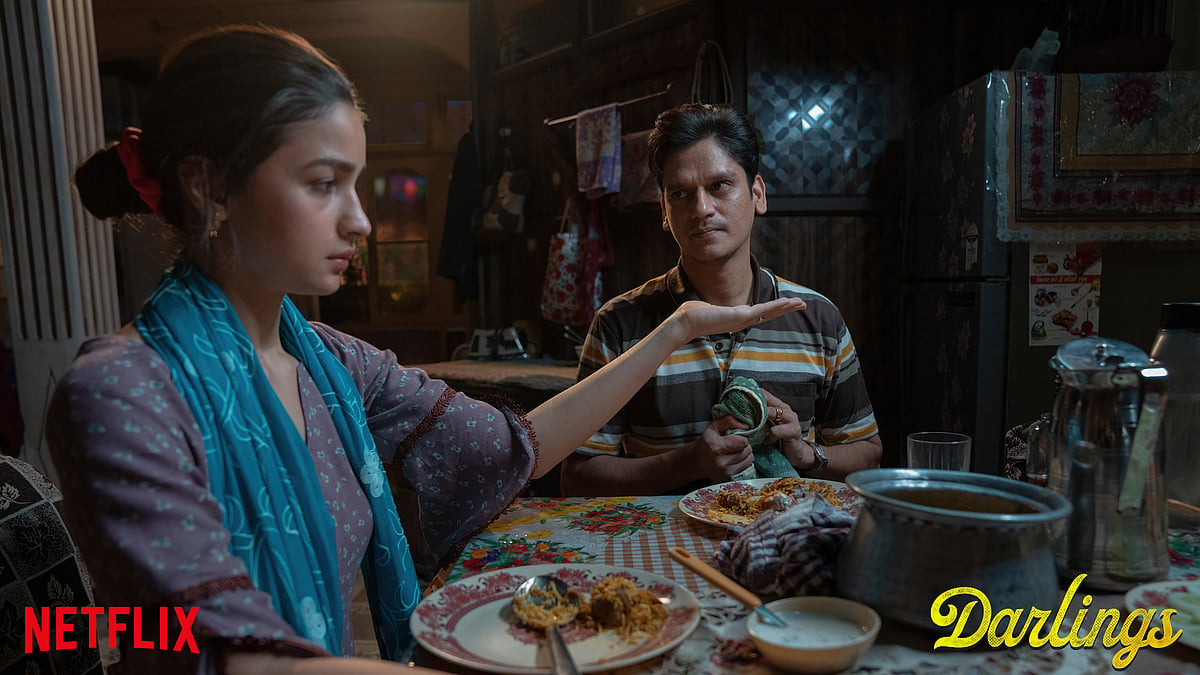'Darlings' Review: A darkly funny journey to self-realisation and a road to salvation
The cast of Darlings makes it a riveting watch. Varma is terrifying and Roshan Mathew as believable as the tender man. Ultimately, it’s all in the hands of the forever solid & reliable Shah and Bhatt

In a matter of two days, I watched Jasmeet K Reen’s Darlings (streaming on Netflix) as many times to enjoy, among other things, the way it comes a full circle on the act of viewing movies. Can you watch them alone in a cinema hall, all by yourself? Forget women, even a lot of men I know find it daunting. What then to say of Badrunissa “Badru” Shaikh (Alia Bhatt), a lower middle-class Mumbai girl with a traditional mindset, and four significant elements in the “plan” for life—stable government job for her man Hamza (Vijay Varma), marriage, a child, and a redeveloped home? Amid all this will she ever find her own personal liberation in the company of popcorns and films? Reen’s Darlings is a darkly funny journey to self-realization for her and a road to salvation for her single mother Shamsunissa (Shefali Shah).
The opening movement of the film is terse, pithy, and powerful in the build up from love and romance of courtship to sheer terror of domestic violence. Each instance of brutality is blood curdling and triggering. More so in how the horror of abusive relationship is accepted in a matter-of-fact way by Badru (like countless women) even as she carries on with the business of life. The night of rage precipitated by stones in dinner leads on to a seemingly perfect morning breakfast of omelette pav and the dismissal of the assault by Hamza as just a small skirmish between husband and wife.
An adherent of the canons of a conventional marriage, the naïve and gullible Badru truly believes she can reform him—by trying to cure him of his alcoholism, seducing him, having a baby with him, besides cooking a steady stream of delicious dishes for him. While she believes in giving time to Hamza, it’s her mother who is more of a free-spirited dissenter, insisting that he be sent back home to God, which is where everyone must go some day anyhow.
The two make a wonderful twosome, a mother-daughter pair unlike any other in Hindi cinema. They are comrades in arms when it comes to their respective fates with men yet have a sharp sense of humour to rise above the depressing circumstances. What if the child resembles Hamza, Shamsu asks a pregnant Badru. Then we will sell it, she says, without batting an eyelid, and you can’t help not feeling a sense of solidarity even while laughing uproariously with them.
Reen and co-writer Parveez Sheikh lend a unique tone and tenor to a story, especially with some crackling dialogue, that we would think can be narrated in one, and only one way—straight and serious. It makes things doubly poignant.
The “repeat telecast” of violence has not just benumbed Badru but become all about inflicting wounds on her mind. All men should be made to stand in a line and shot dead, not even one should be spared, she says in a moment of anger and frustration. But not the kasaai (butcher), insists Shamsu, about her confidante and perhaps more. It’s these little details which make the film fascinating. That there is more to the life of the two than we might be privy to. The fraught relationship with the abusive Hamza aside, there are some striking and eloquent sketches of the women’s interplay with other men, even possibilities of covert alliances that the world might speculate on but is polite in not talking openly about. That are telling without saying a lot. Like the small, tremulous scene of the flirty vibe between Badru and the boys at the chemist shop.



Then there is the elderly Raman Kaka, a silent witness, who gets the black joke about thrashing Hamza into signing the redevelopment contract. He is also the repository of the larger sense of community and empathy in the chawl, also personified in the beautician (Puja Sarup) with her ears, and eyes, to the ground.
Or Zulfi (Roshan Mathew), the gentle man and support system like no other that they have known. Not to forget the cop (Vijay Maurya) at the Byculla station berating women for being meek and suggesting ways to get around Hamza.
It’s through him that the writers bring up the question in the head of the audience. Why is divorce not a way out for Badru? There is the easy dismissal of that possibility in opting for extreme measures. But the most basic and obvious thing here is that in taking that route there would have been no film.
It’s through the conversation of Badru and Shamsu with the cop (about pronunciation of “kh” and their “nissa” and his “nisha” and “sati savitri”) that the film subtly and cannily explores, given the polarized times we live in, the common ground where the Muslims and Hindus meet. Where there is the uneasy awareness of differences—'aap logon mein, hum logon mein’ talk—yet an effort to rise above the divides. Is that mere lip-service or genuine human decency? On the flip side, there’s Hamza’s Hindu boss who humiliates and takes advantage of him till Hamza comes up trumps one day by obliquely giving it back to him on the perceived misconceptions about population explosion associated with the community.
The centrality of food—the eating for men and cooking for women—is another takeaway from the film. Like a joke running all through the film. Where were we when Allah was distributing good luck? Asks Shamsu. We were watching Khana Khazana with headsets on, pat comes Badru’s reply.
What irks is the constant use of plurals and mispronounced English in general (even in the songs). It’s too deliberate and stressed on, irritating in its patronizing attempt to define the characters in the class hierarchies by writers who evidently inhabit another social stratum altogether. It doesn’t give the characters a context so much as looking in at their reality from outside and cracking a joke at them.
The film coasts along swimmingly till about two thirds of the duration and then things begin to unravel as the wrath of Hamza keeps magnifying and Badru takes to absurd ways of getting the better of him. You wait for her to take things to a logical conclusion, but they keep going round and round in circles. A bit of a Bhasad (chaos), as one of the film’s song goes; the narrative spinning a wee bit out of control.
A bhartiya naari barb aside, the film eventually falls into the very moral claptrap that it had been ducking quite nicely. The fable of the frog and the scorpion becomes a cross to bear. Should the frog become the scorpion to get the better of him? Is Badru fighting for her own self-preservation or a lost child and motherhood? Why divert the sheer ugliness of violence and a battle for survival into some philosophizing about respect? Why the urgency to preserve the innocence of Badru which has been breached anyhow by the horrors that she has had to face? Noone’s asking for the melodrama of a zakhmee aurat but in keeping with the dark humour of the film the ethical frame and convenience of the finale felt a bit of a cop out. Pushing the envelope but not entirely opening it.
The quibbles aside, the cast of Darlings makes it a riveting watch. Varma is terrifying in his Dr Jekyll and Mr Hyde game. And Roshan Mathew as believable as the tender man. Ultimately, it’s all in the hands of the forever solid and reliable Shah and Bhatt, matching her in every beat. There is nothing that the fragile, childlike Bhatt (I continue to react like a protective aunt when I see her on screen) can’t do. The glamorous star of countless films is perfectly at home in the role of an ordinary Mumbai chawl girl. In the worst year of Bollywood, she has been a rare beacon of hope. Shine on!
Follow us on: Facebook, Twitter, Google News, Instagram
Join our official telegram channel (@nationalherald) and stay updated with the latest headlines